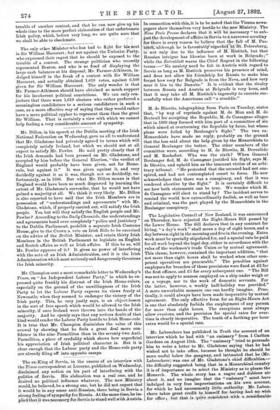The Legislative Council of New Zealand, it was announced on
Thursday, have rejected the Eight-Hours Bill passed by the Lower House. The Bill declares that in any contract for hiring, "a day's work" shall mean a day of eight hours, and a day between eight in the morning and five in the evening. Extra. work must be specially stipulated for, and a special rate be paid for all work beyond the legal day, either in accordance with the rules of the workmen's trade Union or by mutual agreement. This clause, however, contained the important addition, "that not more than eight hours shall be worked when other com- petent operatives are procurable." The penalties against employers for breaches of these provisions were fixed at 22 for the first offence, and 25 for every subsequent one. "The Bill was not to apply to seamen employed on a ship under weigh or on a voyage, nor to the work of domestic servants. For the latter, however, a weekly half-holiday was provided." A more unworkable measure one can hardly imagine. Prac- tically, it could always have been made inoperative by mutual agreement. The only effective form for an Eight-Hours Act is one that absolutely forbids the employment of any person for more than eight hours. The exceptions must always allow evasions, and the provision for special rates for over- time is clearly inoperative. The tenth of a farthing per hour extra would be a special rate.


































 Previous page
Previous page